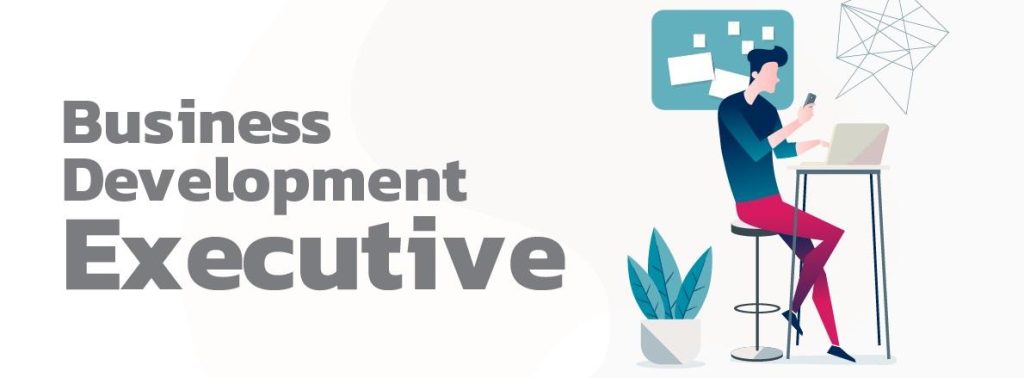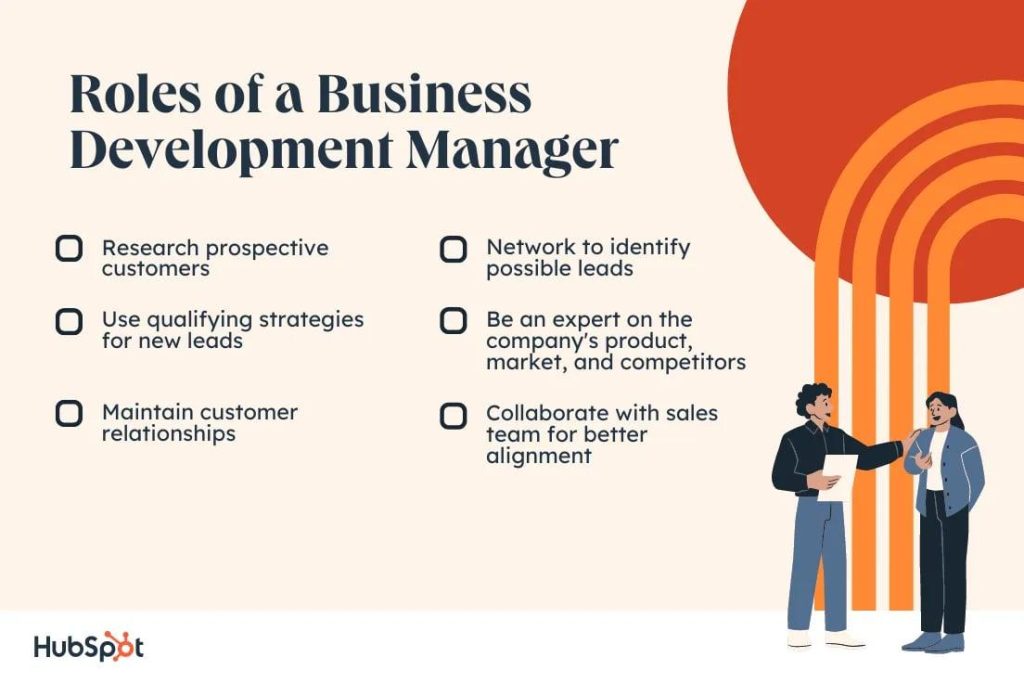We will explain in detail about a Business Development Executive in this guide, which plays an important role in guiding the growth of a company. They study market trends, identify opportunities, and develop plans to expand the business. The duties include developing client relationships, negotiating deals, and cultivating strategic partnerships. This market analysis guides decision-making, providing alignment with industry trends. These effective communication and networking skills are necessary for prospecting and building collaborations. Hence, the role requires a sharp understanding of the competitive landscape and the ability to adjust to growing market dynamics. Overall, Business Development Executives contribute greatly to a company’s success through their proactive approach to identifying and capitalising on business opportunities.
Roles & Responsibilities of a Business Development Executive
In the domain of business development, a Business Development Executive undertakes multifaceted tasks. Which perform market analysis to forge strategic partnerships, their key role drives growth. These professionals navigate market trends, identify opportunities, and formulate strategies for business advancement. Building and cultivating client relationships, arranging deals, and promoting partnerships are essential components. Therefore, it performs effective communication, negotiation skills, and a keen understanding of the competitive landscape are essential. Hence, the Business Development Executive’s proactive approach aligns the company with industry trends, ensuring sustained success through the identification and capitalisation of paying business prospects.

Introduction
A Business Development Executive (BDE) role is key in driving businesses’ growth and success. BDEs are strategic professionals responsible for identifying and capitalising on new business opportunities, promoting partnerships, and growing market reach. Their direct focus is to improve income streams by cultivating relationships with potential clients, arranging deals, and ensuring customer satisfaction.
Further, BDEs act as triggers for business development, playing an important role in reaching organisational goals. They analyse market trends, identify areas for growth, and develop effective methods to move the company forward. With a sharp understanding of the industry landscape, BDEs establish and maintain strong connections with key stakeholders, contributing to the establishment of a robust and diversified client base.
Therefore, the success of a BDE directly connects with the overall success of the business. By leveraging their skills in market research, relationship-building, and strategic planning, BDEs help companies navigate complete landscapes and stay ahead of industry trends.
Learn more about the top MBA Program in Bangalore with Krupanidhi Institutions.
Top Roles & Responsibilities of Business Development Executive
A Business Development Executive plays an important role in driving growth and revenue for a company. Here, we will describe the key responsibilities that contribute to their success in this dynamic role.

1. Market Research and Analysis
Effective market research and analysis are essential for a Business Development Executive. This involves:
- It conducts market studies to identify potential opportunities and trends.
- Analysing competitors to stay ahead in the market.
- Gathering data to make informed business decisions.
2. Sales Strategies Development
It develops strong sales strategies is key to achieving business objectives. Responsibilities include:
- It collaborates with the sales team to create effective plans.
- Identifying target markets and customer segments.
- Implementing innovative approaches to enhance sales performance.
3. Relationship Building and Networking
Building and maintaining strong relationships is essential for business development. This entails:
- Establishing connections with potential clients and partners.
- Cultivating existing relationships for long-term collaborations.
- Networking at industry events to expand the company’s reach.
4. Client Acquisition and Retention
The Business Development Executive is responsible for developing new clients and retaining existing ones by:
- Identifying potential clients through outreach and engagement.
- Creating clear proposals and presentations.
- Ensuring customer satisfaction and addressing concerns promptly.
5. Financial Planning and Forecasting
Financial understanding is crucial for effective business development. Responsibilities encompass:
- Developing and managing budgets for business initiatives.
- Conducting financial forecasting to ensure sustainability.
- Analysing financial data to make informed strategic decisions.
4. Product or Service Knowledge
In-depth knowledge of the company’s products or services is essential. This involves:
- Staying updated on industry trends and advancements.
- Communicating product or service features effectively to clients.
- Providing insights for product or service improvement based on market feedback.
5. Collaboration with Cross-Functional Teams
Business development involves working across various departments. Responsibilities include:
- Collaborating with marketing for cohesive campaigns.
- Coordinating with product development to align offerings with market needs.
- Communicating effectively with different teams for seamless operations.
6. Contract Negotiation and Deal Closure
Business Development Executives are often involved in negotiation and deal closure. This includes:
- Crafting and negotiating agreements with clients and partners.
- Ensuring good terms and conditions for the company.
- Closing deals that align with the organisation’s goals.
7. Continuous Performance Evaluation
Monitoring and evaluating performance is important for ongoing improvement. Responsibilities contain:
- Setting key performance indicators (KPIs) for business development.
- Regularly assessing the effectiveness of strategies and initiatives.
- Making data-driven adjustments to optimize performance.
8. Technology Integration and Innovation
Staying up-to-date on technological advancements is essential. Responsibilities include:
- Identifying and implementing technology solutions for efficiency.
- Embracing innovation to gain a competitive edge.
- Integrating digital tools to streamline business development processes.
9. Crisis Management and Problem Solving
The ability to handle challenges is a critical aspect of business development. Responsibilities include:
- Developing contingency plans for unforeseen circumstances.
- Resolving issues promptly to maintain business continuity.
- Implementing strategic problem-solving approaches for sustainable growth.
Skills Required
In the domain of business development, including a diverse set of skills is essential for success. A Business Development Executive must not only be adept at strategic planning but also possess interpersonal and communication skills to foster meaningful relationships. Here, we’ll explore the key skills essential for excelling in this dynamic role.

1. Communication Skills: Effective communication is important for a Business Development Executive. This skill involves:
- Communicating ideas clearly and productively.
- Active listening to understand client needs.
- Tailoring communication styles for diverse audiences.
- Identifying mutually beneficial terms during negotiations.
- Convincing clients and partners to align with the company’s goals.
- Handling objections and conflicts diplomatically.
3. Analytical and Research Abilities: Analytical skills play a crucial role in market research and strategic planning. This involves:
- Analysing market trends and competitor activities.
- Evaluating data to make informed business decisions.
- Conducting thorough research to identify opportunities.
4. Adaptability and Flexibility: Business landscapes are ever-evolving, making adaptability a key skill. This involves:
- Adopting change and staying open to new ideas.
- Adapting strategies based on market shifts.
- Remaining flexible in the face of unforeseen challenges.
5. Relationship Building: Building and maintaining strong relationships is a cornerstone of business development. This skill includes:
- Networking effectively with clients and industry professionals.
- Nurturing long-term partnerships for sustained growth.
- Establishing trust and credibility with stakeholders.
Check out the Krupanidhi Group of Management to learn more about skills required and how you can proceed in career development to master them.
Conclusion
In conclusion, the Business Development Executive plays a key role in driving business growth and sustainability. Their strategic insight, market insights, and relationship-building skills are indispensable assets. By identifying opportunities, fostering partnerships, and implementing effective strategies, they contribute to a company’s expansion and long-term viability. In essence, the Business Development Executive serves as a pillar, steering the organization towards success by capitalising on emerging trends and cultivating key relationships in the dynamic business landscape.
FAQs (Frequently Asked Questions)
1. What is the role of a Business Development Executive?
The role of a Business Development Executive involves identifying growth opportunities, building strategic partnerships, and implementing plans to expand a company’s market presence. They focus on generating new business, fostering client relationships, and driving revenue growth.
2. What challenges do Business Development Executives face in their roles?
Business Development Executives face challenges such as low competition, navigating complex markets, and adapting to rapidly changing business environments. They must also overcome hurdles in establishing and maintaining fruitful partnerships, meeting targets, and effectively communicating the value proposition of their products or services.
3. Why is writing an effective BDE job description important?
Writing an effective Business Development Executive job description is important as it attracts qualified candidates, sets clear expectations, and aligns with the company’s growth objectives. A well-crafted job description ensures that potential candidates understand the responsibilities, skills required, and the company’s vision, helping in the recruitment of individuals who can drive business success.
4. What is the typical salary range for a Business Development Executive?
The typical salary range for a Business Development Executive varies based on factors such as industry, experience, and location. Generally, salaries can range from INR 60,000 to INR 120,000 annually, with additional incentives or bonuses tied to performance and business development achievements.

